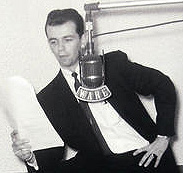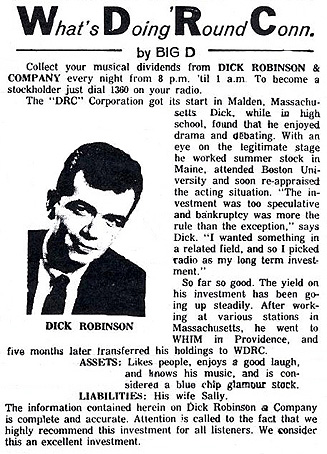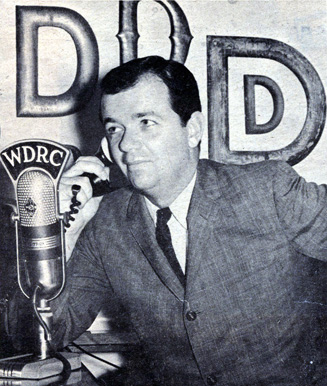
©
2006-2025
Man From Mars Productions
|
Dick
Robinson
|
 |
|
The story began April 17, 1938 in the Boston suburb of Malden where Dick was born an only child. As a kid he worked to overcome a stutter. On his 12th birthday his Dad gave him a portable radio that became his constant companion. He decided then and there to become a radio announcer even though the elder Robinson, a wholesale florist, believed only "clowns got into broadcasting." In high school Dick was heavily involved in drama. He entered debates and public speaking contests, and spent a summer in Maine with a stock theater company, appearing with Anne Baxter and Tyrone Power in John Brown's Body. While still in high school, Dick conducted many record hops which was good training for the succession of hops he later hosted at Big D. Two pivotal life events occurred in 1956. Dick's mother died. And months later he was attacked by a gang at a school dance. His nose was fractured and Dick nearly died during the surgical procedure to repair it. As surgeons performed a tracheotomy, the scalpel nicked his vocal cords. He spent five weeks in a hospital and was told he might never regain use of his voice. |
|
|
That fall it was on to Boston University and a confidence-shattering job audition at WEEI Radio. He later told the Hartford Courant, "my breathing was erratic, my voice trembling and cracking. It was a mess." Dick switched to the Leland Powers School of Radio, Television and Theater in Boston. Dick worked for a time as a theater usher, but eventually landed an audition at WARE in the central Massachusetts town of Ware. For the princely sum of $48.50 a week, Dick did what all announcers did; he learned the radio ropes. He read newscasts, played records, was promoted to program director and even tried his hand at selling commercials. It was that experience which sewed the seeds for opening a broadcast school someday to teach would-be broadcasters what it was really like in the trenches. |
 Dick Robinson at WARE in 1957 |
 What's Doing 'Round Connecticut column - March 22, 1964 |
Dick's radio path took him to WREB in Holyoke, WSPR in Springfield, and a midnight to dawn stint on WPRO in Providence. Then, in 1963, it was across town to WHIM where Dick worked as program director under station manager Richard D. Buckley. The money was certainly better - $190 a week - but the charm faded abruptly nine weeks later when Buckley-Jaeger sold the station. Fortunately Buckley offered him a job in Hartford so Dick, and his wife Sally, uprooted once again. The exciting sounds of British rock and roll were finding their way across the Atlantic Ocean. Dick recalled, "I was in the right place, on the right job, at the right time. We were in the break-out area for new record releases and we released them all, even if we had to pick them up at Kennedy International Airport when the latest Rolling Stones' and Beatles' hits arrived by overseas jet."
In January 1965 Dick began hosting a weekly Saturday Night House Party and in April he instituted a nightly Big D Shindig every night from 8 till 9, keying on the popular ABC-TV show of the same name. |
